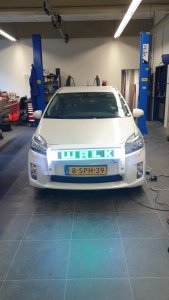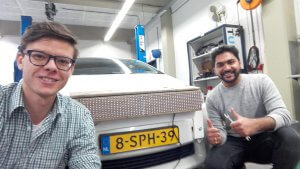Nieuws
VR and Field Study to analyse interaction between pedestrians and autonomous vehicles
22 February 2019A lot of research is being focussed on the interaction between smart infrastructure and autonomous vehicles, on vehicle-to-vehicle communication or on the interaction between vehicles and their drivers. However, little is known about the interaction with other road users outside the vehicle. This interaction with road users such as cyclists and pedestrians is of great importance, since this group is relatively vulnerable and people and robot cars will – literally – have to coexist on the road in the future.
One of the main goals of this research is to determine how self-driving vehicles influence pedestrian behaviour. In the absence of conventional interaction between the driver and the road user, various “external human-machine interfaces” (eHMI), attached to the vehicle, are tested for their effectiveness and safety by means of a study on public roads.

Field tests can pose a risk to pedestrians, they can be costly and are sometimes cumbersome to perform. Virtual Reality techniques such as VR glasses and motion detection can also be used to simulate traffic scenarios. This is a proven efficient, safe and cost-effective technique for simulations. However, whether the results are realistic and effective enough to reliably test the interaction between autonomous vehicles and pedestrians has not yet been proven.
Both issues are addressed in our research: validating different types of eHMI and comparing different test methods. The main research questions of this study are: Does the presence of an external human machine interface increase safety and traffic flow compared to the presence of an active driver in terms of safety distance? And how do pedestrian performance in terms of speed and distance perception and behaviour in Virtual Reality (VR) differ from reality?
The Research lab Automated Driving Delft (RADD) helps us to realize our study by providing us technical equipment and support with the experiments.

Rakshit Agarwal & Marc Barendse – TU Delft
Are you interested in participating in the study or would you like more information? Then please contact us via:
https://www.linkedin.com/in/rakshit-agarwal-432173b0/
https://www.linkedin.com/in/marc-barendse/
IN THE MEDIA
- THE GREEN VILLAGE: AN INNOVATIVE TESTING GROUND Published in: Cobouw
- THE NETHERLANDS ‘BEST PREPARED’ FOR AUTONOMOUS CARS, CYCLISTS MAKE ARRIVAL DIFFICULT Published in: NOS
- SENSOR USE WITH AUTONOMOUS VEHICLES Published in: De Volkskrant
- COMEDIAN PIETER JOUKE SEES POSSIBILITIES Published in: delft.nl
- RIJKSOVERHEID.NL: SPEECH BY MINISTER SCHULTZ VAN HAEGEN AT THE OPENING OF THE SMART MOBILITY RESEARCH LAB Published in: Rijksoverheid.nl
NEWS
- VR and Field Study to analyse interaction between pedestrians and autonomous vehicles Published on: Friday 22 February 2019
- Folluw up research car sickness Published on: Wednesday 19 December 2018
- Wanted: Research Opportunity at RADD Published on: Wednesday 07 February 2018
- Bikesim Published on: Monday 23 October 2017
- Opening of Researchlab Automated Driving Delft Published on: Saturday 24 June 2017
